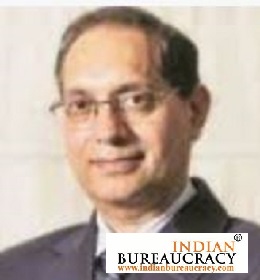Shri Tuhin Kanta Pandey IAS (Odisha 1987) presently Secretary- Finance and Secretary- Department of Revenue has been appointed as Chairman- Securities and Exchange Board of India (SEBI) for a period of three years.
Shri Tuhin Kanta Pandey is a distinguished civil servant with an illustrious career spanning over three decades. His leadership and expertise have been instrumental in shaping India’s economic policies, public asset management, and administrative reforms. Throughout his tenure, he has demonstrated a keen ability to drive strategic initiatives, ensuring fiscal stability and economic growth.
Shri Pandey began his journey in the Indian Administrative Service (IAS) in 1987, undergoing rigorous training before assuming his first field role as Sub-Collector in 1989. His early years in land revenue management and district administration laid a strong foundation for his future leadership roles. By 1992, he had transitioned to industry development, serving as Managing Director, and later took on key responsibilities in finance and textiles.
His tenure as District Collector and Magistrate of Sambalpur (1994–1995) showcased his exceptional governance skills. He soon moved into central administration, handling commerce and industry affairs as Deputy Secretary at the Centre (1997–2001). His international experience was further enriched with a prestigious foreign posting at the United Nations Industrial Development Organization (UNIDO) from 2001 to 2003.
Upon returning to India, Shri Pandey took on critical roles in personnel and general administration in Odisha, followed by foreign training in London in 2006. His expertise in finance became more pronounced as he served as Commissioner of Commercial Taxes and later as Principal Secretary in the Finance Department of Odisha.
His tenure at the Planning Commission (2009–2014) and the Cabinet Secretariat (2014–2016) allowed him to contribute significantly to national policymaking and governance frameworks. By 2016, he was appointed Principal Secretary in the Finance Department, strengthening fiscal management at the state level.
In 2019, he took on one of his most impactful roles as Secretary of the Department of Investment and Public Asset Management (DIPAM), where he played a key role in strategic disinvestment and financial restructuring of public sector enterprises. His expertise in managing India’s investment landscape positioned him as a crucial figure in economic governance.
Shri Pandey’s career culminated in his appointment as Finance Secretary (Revenue) in January 2025, where he continues to lead with vision and integrity, ensuring robust revenue management and fiscal prudence. His vast experience across finance, commerce, planning, and governance makes him one of the most respected bureaucrats in India, committed to driving the nation’s economic progress.
The Securities and Exchange Board of India (SEBI) is the regulatory authority for securities and commodity markets in India, functioning under the Ministry of Finance, Government of India. Established on 12 April 1988 as an executive body, it was later granted statutory powers on 30 January 1992 through the SEBI Act, 1992.
Evolution of SEBI | Before SEBI’s formation, India’s securities market was regulated by the Controller of Capital Issues under the Capital Issues (Control) Act, 1947. Recognizing the need for a more structured and autonomous regulatory body, SEBI was introduced in 1988 and later transformed into a statutory authority in 1992.
SEBI’s Headquarters & Presence | Headquartered in Bandra Kurla Complex, Mumbai, SEBI operates through its regional offices in New Delhi, Kolkata, Chennai, and Ahmedabad. Initially, SEBI had 17 local offices across India to promote investor education, but post June 2023 restructuring, 16 were closed to streamline operations.
SEBI’s Governing Body | SEBI is managed by a Board of Members, including:
- Chairman – Nominated by the Union Government of India.
- Two Members – From the Union Finance Ministry.
- One Member – From the Reserve Bank of India (RBI).
- Five Additional Members – Nominated by the Union Government, out of which at least three must be full-time members.
SEBI’s Role & Regulations | SEBI ensures transparency, investor protection, and market integrity. A key amendment in 1999 brought collective investment schemes under SEBI’s regulation, except for nidhis, chit funds, and cooperatives. As the backbone of India’s capital markets, SEBI continues to strengthen investor confidence and uphold fair trade practices.
IndianBureaucracy.com wishes Shri Tuhin Kanta Pandey the very best.





